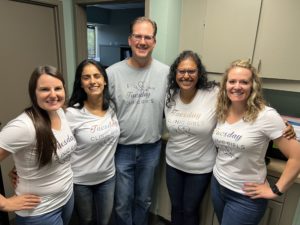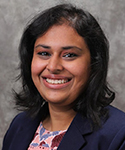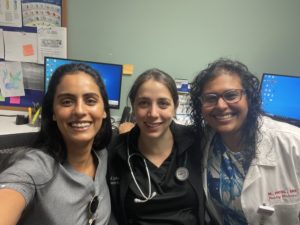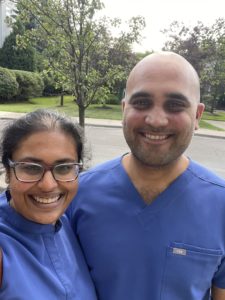July 19th, 2022
Adventures of Family Medicine Clinic Days
Mikita Arora, MD

Tuesday Clinic as a PGY-2 with Dr. Kelly Mason (APD), Dr. Hima Chopra, Dr. Mark Schury (PD), me, and Dr. Whitney Fron
Family Medicine Continuity Care Clinic
Wow! I cannot believe it’s my final year of residency. I am currently a 3rd-year Family Medicine Resident at McLaren Oakland Hospital in Pontiac, MI. Our clinic is a nonprofit, federally qualified health center and an accredited patient center medical home. Our target population is the medically underserved in an urban setting. The patients who come to our clinic are very sick. Many of them haven’t seen a doctor in years. If they do see a physician, most of them are noncompliant. Their problem list is sometimes 8 to 10 assessments deep. Their problems have to be addressed at every visit, because either they are critical or you don’t know if you will ever see them again.
We provide them with lots of resources: access to a nutritionist, shelter, or counseling and rehab programs. The environment that my program director, Dr. Mark Schury, and associate program director, Dr. Kelly Mason, have created is very supportive and a magnificent one to train in. As a third-year resident, I have two clinic days and see as many as 16 to 18 patients per clinic day. These interactions with my patients have opened my eyes in numerous ways.
Clinic Patient Adventure
One of my very first clinic patients impacted my training tremendously. She has helped me grow into the physician I am today. When I first met, her health was already deteriorating, and she was very noncompliant with medical advice. In August of my intern year, I remember telling her, “Hey, you are drowning in your body’s fluid. You need to go to the hospital. There isn’t much I can do for you here anymore.” She would tell me how she hated the hospital and did not want to go. Finally, 6 months later, I was able to convince her to go to the hospital.
During that hospital stay, I went to visit her, because our hospital did not allow outside visitors due to COVID restrictions. I remember how happy and grateful she was to see me. We were chatting and having such a good time. Suddenly, our conversation was interrupted by the internal medicine attending. He asked her a simple question, “What do you eat every day?” Her response was “Ramen noodles and sometimes eggs.” The attending stated, “That explains everything,” and walked out. My heart sank. This was my clinic patient, and I did not know she did not have access to food. I had never even asked her what she ate.
During the past 2 years, I had seen her at the clinic whenever she came in, and she had shared her life stories with me. I had become her confidant. As family medicine physicians, we form bonds with our patients, which turn into lifelong relationships. Our patients trust us with their health. We listen to their problems and help solve them. However, we cannot fix a problem that we are unaware of. And I never asked her what she ate.
Recently, she was hospitalized again. When I went to see her, she was a zombie. Her nurse told she had overdosed on hydromorphone. I thought to myself, “Where did she even get it?” So I looked up her name in the Michigan Automatic Prescription System. She had told me she was taking Norco, prescribed by her pain management doctor. However, I did not know that she was also being prescribed hydromorphone. She had left out the other pain medications she was taking.
What I Learned from this Patient
-
- One of the greatest lessons that I learned from her was asking the right questions. If you don’t ask the questions in a certain way, you will not get the answers you need. The answers are there, but you need know how to find them.
- Food insecurity is a healthcare problem. If your patients don’t have access to healthy foods, then they will continue to be sick from eating processed food. My goal is to create access within the community through a community service project. More to follow in a future post!
- Communication among providers is the key to providing excellent patient care.
- The power of the physician is the ability to heal, but sometimes it’s the patients who really heal us.
It’s our job to educate the patients, but they are ones teaching us something new every day.





Thank you, Dr. Mikita, for sharing your thoughts about your experiences in FM residency and showing the complexity of modern day cases. We can build our assumptions about the disease, based on the information, that a patient disclosed, or what appears in a medical record, the rest is a quest. And you pointed at a serious issue of food insecurity effects on human health. Food insecurity is a problem, that strikes any country nowadays. In a situation you described your patient would get support, but she might have gotten it earlier, if there was a tool in primary care setting for screening.
Could you please clarify about 2 clinic days you have at the last year of your residency?